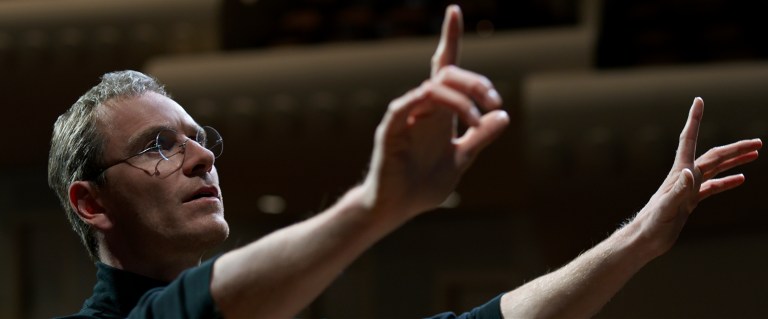“The Social Network” was iconoclastic, deconstructing — if not destroying — the rags-to-riches narrative of Facebook founder Mark Zuckerberg. By contrast, Danny Boyle’s “Steve Jobs,” also penned by “West Wing” scribe Aaron Sorkin, is downright exultant: Here, “Steve Jobs” is torn to shreds, beaten and bruised by demonstrations of cruelty and wickedness; and yet, by film’s end, he emerges near-unblemished. The Steve Jobs of Sorkin and Boyle’s imagination is a towering achievement: A broken machine of a man rendered immaculate by love.
As a work of art, “Steve Jobs” may be plagued by an inherent sense of redundancy (Jobs’ life has sparked three biopics in three years), but this version — the latest and greatest — is vindicated by a closeness with the Silicon Valley savant that is both wonderfully seductive and exquisitely entertaining.
Centered around three major product launches – the Macintosh in 1984, the Black Cube in 1988 and the iMac in 1998 – “Steve Jobs” transpires in the wings and dressing rooms of various symphony halls and theaters across San Francisco and across decades.
Within each segment, an array of Apple affiliates and personal confidantes – including right-hand woman Joanna Hoffman (Kate Winslet), disgraced Apple CEO John Sculley (Josh Daniels), and daughter Lisa (Makenzie Moss, Ripley Sobo and Pearla Haney-Jardine) – accost and challenge Jobs (Michael Fassbender), forcing him to address allegations of parenthood, concerns about product expectations and arguments regarding the hubris of humankind. These interactions occur at rapid-fire speed, compressed by the limitations of time and space (and made ever the more claustrophobic by Boyle’s flair for split-second cross-cutting).
What emerges is an operatic character study in three parts. Scored by Daniel Pemberton, “Steve Jobs” writhes with tension — between characters, between love and hate, between ambition and reception — all gloriously amplified by a stellar electronic soundtrack, flavored with symphonic strings and thundering percussion.
By its very nature, “Steve Jobs” unfolds without pause or release, but the music somehow validates its unforgiving pacing, elevating minor quibbles to grand theatrical dialogues. One gets the sense that, if not pressed onward by the verve of the unfolding action, the film’s characters might reach a suitable compromise over coffee. Instead, trapped in the flurry of revolution, they sling insults and attacks, aspiring to strike a blow so devastating that it might stun Jobs, their opponent, into silence.
Such Sorkin-speak can grow irksome over time, but the script wisely anchors these clashes in a thread about the greatness of fatherhood. In theory, it’s easy to dismiss Steve Jobs as an egomaniacal prick (a man so concerned with innovation he makes no effort to innovate in his personal life); but, there’s something simplistic in defining a modern legend by a series of Herculean flaws, and Sorkin rightly pushes against the impulse to condemn.
Considering Jobs’ struggle to accept Lisa as his own, Sorkin’s writing grapples with the redemptive powers of love and legacy, contending that each generation can make amends for, if not erase, the sins of her forebears. In Lisa, Jobs finds a better half, eschewing millennial cynicism for an optimism that embraces the compromise between compassion and intellect.
Of course, these sentiments would likely ring false if not for the labors of the cast. Exiting the theater, it’s difficult not to play Oprah with awards praise: “You get an Oscar, you get an Oscar, you get an Oscar!” In “Steve Jobs,” everyone is on their absolute best behavior and the results are bewitching.
Among the assembled players, Winslet — stuck elevating mediocre projects for years — is perhaps most striking: As Hoffman, the lone survivor of Jobs’ myriad torments, she sports a rad Polish accent and a level of restraint that easily makes her the wisest and most relatable woman in every room.
As for Fassbender, he’s quite good too. Though he bears little resemblance to Jobs, his performance dares not attempt facsimile. Instead, Fassbender generates his own understanding of Jobs, revealing insecurity, youth, and innocence within a man prone to gross caricature. Jeff Daniels is also of note, but — in reality — so is everyone in this dazzling cinematic venture.
Contact Will Ferrer at wferrer ‘at’ stanford.edu.
